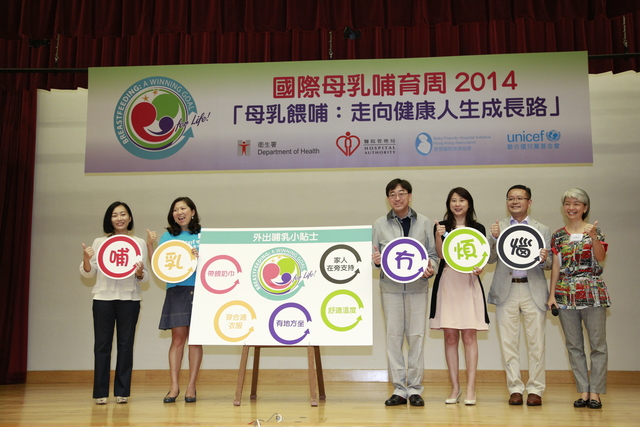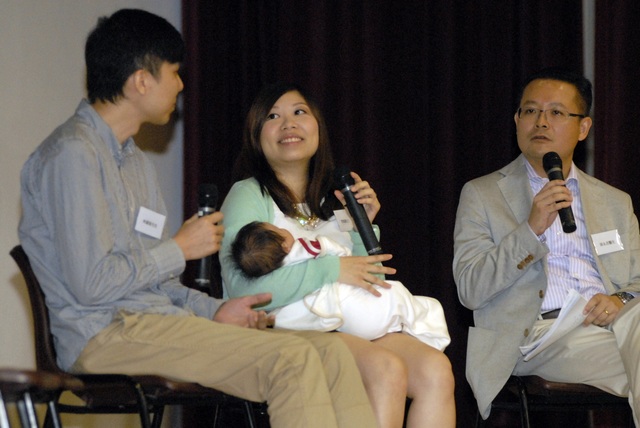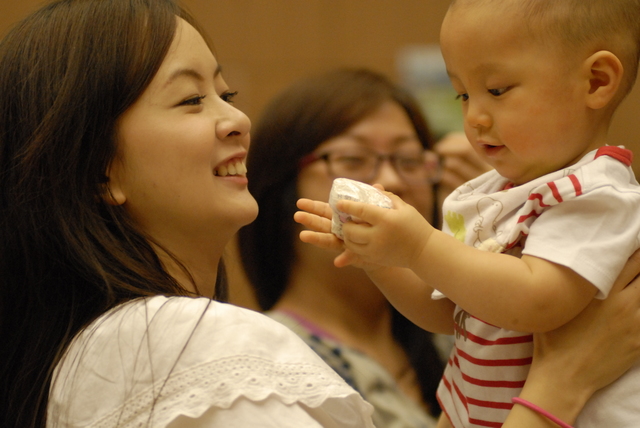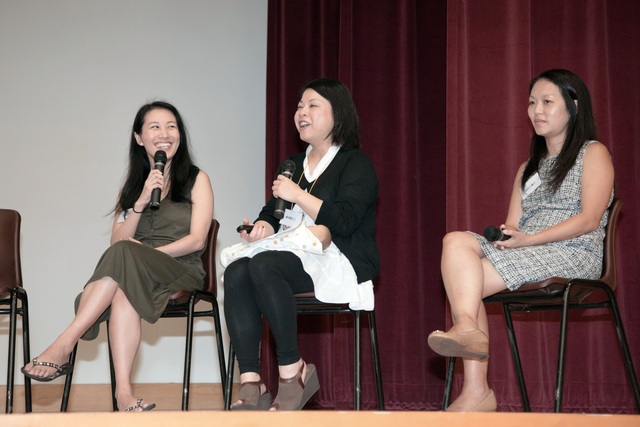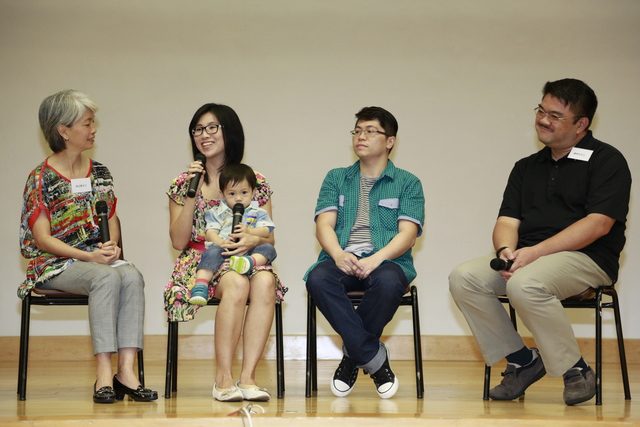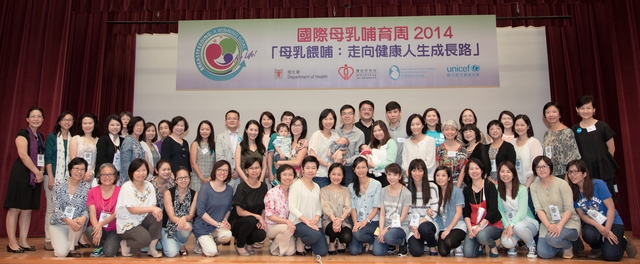World Breastfeeding Week 2014 Celebration Event Breastfeeding rate on discharge stands firmly at over 80% while conditions facilitating exclusive breastfeeding still waits to be improved
Hong Kong, 26 July 2014 – The Department of Health, Hospital Authority and UNICEF Baby Friendly Hospital Initiative Hong Kong Association (UNICEF BFHIHKA) organized World Breastfeeding Week 2014 Celeation Event today. Results of the latest World Breastfeeding Week Annual Survey 2014 (the Survey) of UNICEF BFHIHKA were released, showing nearly 85% of mothers initiated breastfeeding on discharge from hospitals, but only a quarter of mothers exclusively breastfeed their children. Dr Ko Wing-man, Secretary for Food and Health, joined the event as the Guest of Honour. Together with other officiating guests, he unveiled tips for breastfeeding in public areas for over 250 breastfeeding mothers and mothers-to-be.
| According to the Survey, the breastfeeding rate on discharge remains over 80%. Out of the 57,044 births in 18 hospitals in Hong Kong with maternity units in 2013, 84.2% of them have been breastfed on discharge, just 1.6% lower than that of 2012. Dr Maggie Koong, Vice-chairman of the Hong Kong Committee for UNICEF and Chairman of UNICEF BFHIHKA said, “Both the Government and NGOs are working hard to lay out milestones for breastfeeding in Hong Kong. The theme of World Breastfeeding Week 2014 is ‘Breastfeeding: A Winning Goal for Life!’ – ‘Life’ is the key point, breastfeeding ings life-long benefits.” |
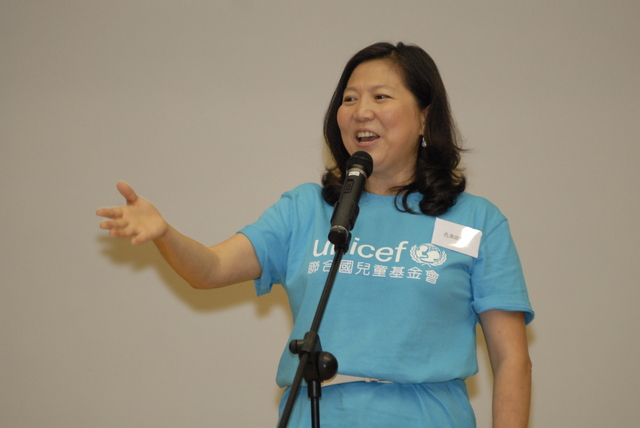
|
|
Dr Ko Wing-man, Secretary for Food and Health, said, “By June 2014, there are 236 babycare rooms on government premises. In the coming few years, at least 40 new babycare rooms will be introduced.” He added, “The key to successful breastfeeding not only comes from persistence and effort of mothers, but also from the support of healthcare professionals, families and society. To encourage mothers to breastfeed for a longer time, we need a comprehensive strategy to create an environment that protects, promotes and supports breastfeeding.”
The Survey also shows improvements on the compliance to the International Code of Marketing of Breastmilk Substitutes (“International Code”) developed by UNICEF and World Health Organization (WHO). 18 hospitals with maternity units continue to stop receiving free supplies of infant formula since 2012. |
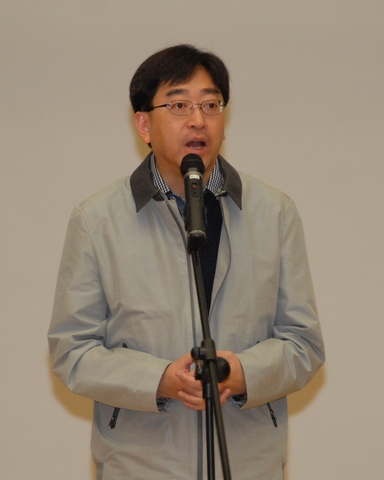
|
According to the Survey, 6% of hospitals noted formula milk manufacturers are using texts or pictures to idealise artificial feeding, compared to 18% in 2012. 6% of hospitals also observed advertisements of infant formula, bottles, and teats through posters, calendars etc, compared to 12% in 2012. But it does not mean formula milk manufacturers have stopped their promotions to newborn mothers. 11% of hospitals found out mothers were given materials with information about infant feeding published or distributed by infant formula milk companies, compared to 0% of last year.
The Survey also revealed further support is needed to help mothers facilitate exclusive breastfeeding. The exclusive breastfeeding rates ranged from 10% to 65% in public hospitals for births in 2013 and the rates were even more varied in private hospitals, from 1% to 97%. The mean exclusive breastfeeding rate of 24.3% is still far from satisfactory with much room for improvement.
The “Ten steps to successful breastfeeding”, such as mother and baby rooming-in, training of medical and nursing staff and promoting mother support groups, are important to support the breastfeeding in hospitals. In the Survey, however, only 16% of obstetrics and gynaecology doctors, and 33% of paediatric doctors have completed an 8-hour training to support the implementation of the breastfeeding policy within six months of joining the service.
Over 250 breastfeeding mothers, expectant mothers and their families attended the event to learn more about breastfeeding. Officiating guests such as Dr Ko Wing-man, Dr Maggie Koong, Dr Teresa Li, Assistant Director of Health (Family and Elderly Health Services) of Department of Health, Dr Rebecca Lam, Chief Manager (Patient Safety & Risk Management) of Hospital Authority, and Dr Leung Wing-cheong, Vice-chairman, UNICEF BFHIHKA, unveiled five tips for breastfeeding in public areas for them.
The five tips include 1. wearing comfortable clothing for breastfeeding, 2. inging a breastfeeding scarf, 3. finding a place with moderate temperature and 4. a comfortable seat to breastfeed, and 5. have family members to stand by around to seek assistance when necessary. The guests also wish the general public understand the needs of breastfeeding in public areas, and create a more breastfeeding-friendly environment for the mothers.
Dr Leung Wing-cheong, Vice-chairman of UNICEF BFHIHKA and Chief-of-service, Department of Obstetrics and Gynaecology, Kwong Wah Hospital shared some mother-friendly birthing practices with expectant mothers. He said, “We hope to help mothers initiate breastfeeding within half an hour of birth. For vaginal births, mothers can immediately enjoy skin to skin contact with their newborn babies, which allows them to initiate breastfeeding at the soonest. But for mothers with caesarian deliveries under general anaesthesia, they can only have skin to skin contact after they were responsive. ”
Dr Rosanna Wong, Associate Consultant, Department of Paediatrics and Adolescent Medicine, Queen Mary Hospital and a mother shared experience on breastfeeding premature babies. Dr Wong said, “Unless medically indicated, newborn babies do not need any food or drink other than breastmilk. Breastmilk contains enough nutrition and immune components for infants. For premature babies with immature gut and immune function, breastmilk is even more important for their immuno-protection and health.”
Mr Eddy Lo King-Sang, Corporate Affairs Director of Christian Family Service Centre, and his employee, Ms Clare Lam, shared on ways to create a breastfeeding friendly workplace. With support from the organization, Clare could pump three times a day in a locked private room, and have a fridge for breastmilk storage. Clare said, “I had postpartum depression. With the support from my family and employer, I recovered gradually and manage to breastfeed my baby exclusively. From my experience you can see the support from employer is very crucial.” The employee, Mr Lo added, “The organization has only put a very little effort. And these arrangements never affect Clare’s work performance. Instead, this reinforced Clare’s sense of belonging to the organization. She has been even more hard-working.”
Dr Ko Wing-man said, “I appreciate for all the efforts by different groups. I hope everyone will keep taking action to support breastfeeding, so that our next generation can all grow up healthily.”
– End –
